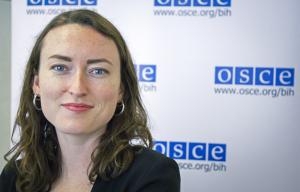Diana Digol
Deputy Head of Programme Office - OSCE Programme Office in Astana

Diana Digol is the Deputy Head of the Programme Office in Nur-Sultan, Kazakhstan. She is inspired by international civil service and puts her multiple skills and languages to use to support our comprehensive approach to security.
How did you end up at the OSCE? Tell us a bit about your career journey.
It was my long-standing dream and goal, from childhood. My parents told me that the best professionals in this world work for the OSCE and/or the United Nations. They also further told me that I had to study profession and learn foreign languages, before I can give it a try. I took this as a road map. I studied all aspects of international: economics, law, relations, studies, diplomacy, security, which culminated with a Phd degree and five languages.
To make it short, with some perseverance, I got my first position as a Project Officer with the Extra Budgetary project at the OSCE's Office for the Democractic Institutions and Human Rights. This has been preceded and followed by some OSCE consultancies for five various OSCE field missions. My next three-year assignment, this time in politico-military dimension, was with the mission in Kyrgyzstan. Since May 2017, I joined the mission in Kazakhstan, as a Deputy Head, the first truly senior management position.
What has been the most exciting part of working here?
I like coming to job every day, even if I know it will be another challenging day, and maybe extremely long one. A long day does not mean that you are bad in time management; sometimes, this is just a reality, explained by the time difference in the area “from Vancouver to Vladivostok”, or at least between Nur-Sultan and Vienna (3-5 hours, depending on the season).
I like the fact that that this job helped me understand and see in practice how challenging it can be to reach a compromise and find a common ground on the issue. Working at the OSCE offers me also the opportunity to meet different people, senior and junior, women and men, public officials and civil activists, political leaders and apolitical civilians, people having power to solve issues and those in demand of those solutions. I am glad that the OSCE is here to provide support in finding solutions, based on the best practices, which worked elsewhere and might work here as well.
Yet another excitement is added by the time limit you can serve in the Organization (from 4 to 10 years, depending on the post). It makes you do your best in your current position, because you will have to demonstrate your achievements and ask for recommendations, when applying elsewhere; stay competitive in your professional field abreast of the latest developments and develop your skills which your field might require soon; and keep your networking open and evolving.
What have you learned about yourself while working at this capacity?
I am still learning about myself, and this is also a part of reward, that working for an international organisation provides. I learnt that my basic needs are not that big, and I can feel comfortable even in precarious conditions. I learnt that there are good people everywhere, as well as bad people, and this has nothing to do with the economic welfare, religion, nationality or level of education. I also learnt the power of a smile, which helps reduce tension almost in any situation.
What career advice would you give to women across the OSCE region considering opportunities in international civil service?
The international civil service sector is still an emerging field, despite that international organisations exist for several decades now. While describing yourself in these terms in other languages than English, you often have to explain what exactly you are doing and where exactly you are working, and why it is exciting. Thus, to a certain extent, joining the international civil service means getting out of your comfort zone; it also means joining an adventure, which will take you to unknown destinations.
What would you recommend to any women looking for positions at the Organization?
The OSCE is an evolving Organization. At the same time, the nature of challenges to international security has changed. Thus, use your comparative advantage to the maximum, bring up a unique set of skills, which is currently demanded or will be soon, and be persistent!

